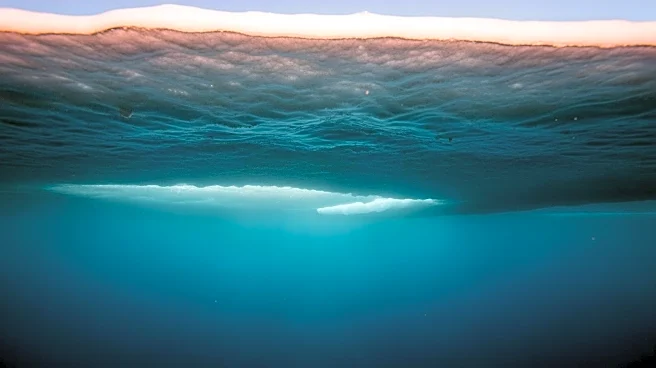What's Happening?
Recent research has uncovered significant warming in the deepest parts of the Arctic Ocean, attributed to warmer Atlantic water from Greenland. The study, conducted by the Ocean University of China, found that the Eurasian basin's waters between 1500
and 2600 meters deep have warmed by 0.074°C since 1990. This warming is due to the Atlantic Meridional Overturning Circulation bringing warm water northwards, combined with geothermal heat and reduced cold water influx from Greenland. The melting Greenland ice sheet has introduced more freshwater into the basin, slowing the sinking of cold, salty water and raising deep water temperatures. This warming process could contribute to sea ice melt and potentially release methane from sub-sea permafrost.
Why It's Important?
The warming of the Arctic Ocean's depths has implications for global climate patterns and environmental stability. As the Greenland ice sheet continues to melt, the influx of freshwater disrupts traditional oceanic circulation, potentially accelerating climate change effects. The warming could lead to further sea ice reduction, impacting global sea levels and ecosystems. Additionally, the potential release of methane from thawing permafrost poses a significant risk, as methane is a potent greenhouse gas. Understanding these processes is crucial for predicting future climate scenarios and developing strategies to mitigate adverse effects.
What's Next?
Further research is needed to monitor the ongoing changes in the Arctic Ocean and their broader impacts. Scientists will likely focus on the interaction between oceanic warming and ice sheet dynamics, as well as the potential for methane release. International collaboration may be necessary to address these challenges, with potential policy implications for climate change mitigation efforts. Continued observation and modeling will be essential to anticipate and manage the consequences of these environmental shifts.
Beyond the Headlines
The warming of the Arctic Ocean highlights the interconnectedness of global climate systems and the cascading effects of regional changes. It underscores the importance of comprehensive climate monitoring and the need for adaptive strategies in response to emerging threats. The situation also raises ethical considerations regarding the responsibility of nations to address climate change and protect vulnerable ecosystems. Long-term shifts in oceanic and atmospheric dynamics could redefine global weather patterns, necessitating a reevaluation of current climate models.















